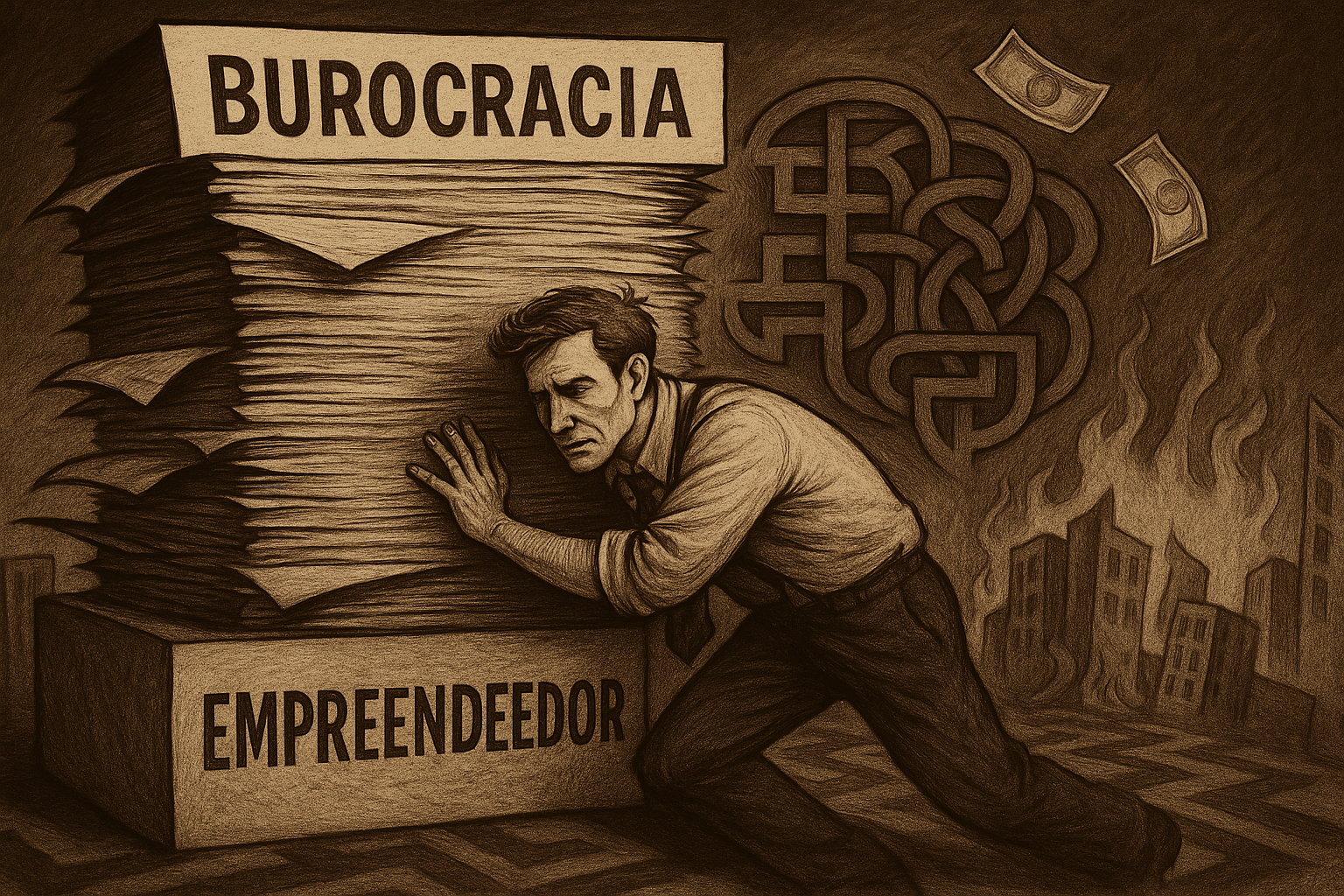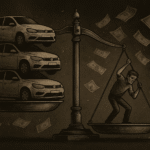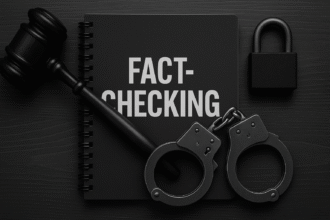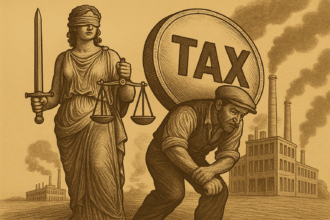The official discourse extols entrepreneurship as the driving force of the economy. But anyone who tries to open or maintain a business in Brazil quickly discovers the truth: the biggest competitor is not another company — it is the State. Complex taxes, absurd regulatory requirements, legal uncertainty and opaque oversight form a system that discourages economic freedom and turns entrepreneurs into hostages in a bureaucratic maze.
A country that punishes those who produce
An international ranking created by two German universities researched the tax collection model of one hundred countries and reached a result that was not at all satisfactory for Brazilians: Brazil has the most complicated tax system in the world. Source – Jovem Pan
Brazilian companies spend, on average, more than 1,500 hours per year just to comply with tax obligations. There are dozens of guides, declarations and cross-checks that vary according to the sector, state and municipality. Errors are punished with automatic fines, while the interpretation of the law changes depending on the tax inspector.
This is not a coincidence — it is a design. A State that collects revenue from complexity becomes dependent on it. Bureaucracy ceases to be a problem and becomes an instrument of control.
The terror of MEI: the micro that supports the macro
Even the Individual Microentrepreneur is not exempt. The MEI was created to formalize informal businesses with promises of simplicity and low cost. But, in practice, many are pushed into informality due to obligations that grow year after year.
According to a survey by CNN Brazil, almost half of MEIs need to resort to loans to keep the business running.
What was supposed to be a gateway has become a trap. Small businesses are suffocated by annual declarations, revenue limitations, lack of credit, non-compliances and a hostile regulatory environment.
Meanwhile, large companies with access to tax planning, government incentives and political relationships continue to operate with margin and protection. According to a survey by the website Politicize!, among the sectors that receive the most tax subsidies in Brazil are agribusiness, the automotive industry, the energy sector and the financial sector. These benefits can exceed R$300 billion per year in tax breaks and exemptions, often without clear compensation. In practice, this means that small businesses, who face bureaucracy without favors, end up financing the big ones — feeding an unequal, concentrated and politically sustained system.
Entrepreneurship in Brazil means surviving the State
It is not enough to have a good product, a viable business model or a willingness to work. The entrepreneur also needs to be an accountant, a lawyer and an interpreter of the fine print of the law. He or she needs to navigate between agencies such as the Federal Revenue Service, city hall, trade board, health surveillance, fire department, notary's office, bank, union, Procon, Anvisa, Sefaz, among others.
Each step requires documents, protocols and “useful time”. Instead of generating value, the entrepreneur spends energy justifying his existence to a state apparatus that views him with suspicion.
Meanwhile, the official discourse repeats that “the entrepreneur is the one who creates jobs”. Hypocrisy: the one who creates jobs is the one who survives the machine that grinds down companies.
Informality as an escape valve
Faced with this scenario, millions of Brazilians resort to informality. Not out of dishonesty, but for survival. It is more rational to sell sweets on the street without a receipt than to open a legal business and be fined for failing to comply with an unknown regulation.
The state creates chaos and then blames citizens for trying to escape it. Combating informality is talked about as if it were a moral problem — when in fact it is a response to bureaucratic oppression.
Informality is a form of resistance. But, unfortunately, it is also a symptom of institutional failure: it shows that the State has lost the ability to protect those who produce and prefers to punish those who do not submit.
The cost of bureaucracy: time, money and freedom
All the time and energy spent on bureaucracy are resources diverted from innovation, product improvement and business expansion. It is a form of invisible impoverishment. Brazil could produce more, generate more jobs and collect more revenue — but it chooses to punish productivity with obstacles.
According to the World Bank report Doing Business, Brazil takes 17 days to open a company, while in countries like Singapore or New Zealand the process takes less than 1 day. The difference is more than bureaucratic — it is cultural and institutional.
Here, the entrepreneur is guilty until proven innocent. It is the State that demands it, not the consumer. And those who monitor do not encourage it: they only fine it.
The entrepreneur as a political enemy
The root of the problem is ideological. In much of Brazilian political culture, businesspeople are viewed with suspicion — as someone who exploits, makes “too much” profit, or circumvents rules. This mentality creates an environment hostile to prosperity and merit.
Instead of seeing the entrepreneur as an agent of social transformation — someone who generates wealth through freedom — the State treats him as a necessary evil to be controlled.
This translates into poorly written laws, contradictory interpretations, legal instability and a culture of punishment. It is the complete inversion of the principle of economic freedom.
The “consumer protection” fallacy
Much of the bureaucracy is justified under the pretext of “protecting the consumer.” But who is actually protected?
When legal requirements prevent a small producer from selling homemade jams without a commercial kitchen, who benefits? When a barber needs multiple licenses to cut hair, who is protected?
In practice, these rules favor large companies — which have the structure to meet the requirements — and drive small companies out of the market. This is protectionism through regulation, sold as security, but which acts as a barrier to entry.
Who profits from bureaucracy?
The answer is simple: those close to power. Tax law firms, regulatory consultancies, inspection unions, bodies with veto power and already established companies that want to protect their market.
Bureaucracy is profitable for those who have learned to exploit it. And devastating for those who only want to produce.
This permission economy prevents Brazil from flourishing. Wealth does not arise in Brasília, it arises from the individual's freedom to create, exchange, invest and work without unnecessary constraints.
Conclusion: Freedom to Thrive
Brazil needs to stop treating entrepreneurs as suspects and start seeing them as protagonists. No country will be prosperous while its value creators are persecuted by a state machine that does not understand — and does not want to understand — what economic freedom is.
Reducing bureaucracy is not a liberal whim: it is a moral necessity. Every company that is prevented from being born is a family that stops generating income, an idea that does not come to fruition, a city that loses vitality.
As long as the State is the biggest obstacle to growth, Brazil will continue to reward dependence and punish initiative.
It's time to reverse this logic. Less paper, more freedom. Less State, more market. And above all: respect for those who dare to undertake in a country where producing is an act of resistance.
📩 Do you know anyone trying to start a business and being suffocated by the State? Share this text and subscribe to the newsletter Economic Radar. Receive weekly analyses that expose the invisible costs of state interventionism.
References:
- Young Pan – Brazil has the most complicated tax system in the world
https://jovempan.com.br/arquivo/samy-dana/brasil-tem-o-sistema-de-impostos-mais-complicado-do-mundo.html - CNN Brazil – Almost half of MEIs need a loan to keep their business active, survey shows
https://www.cnnbrasil.com.br/economia/financas/quase-metade-dos-meis-precisa-de-emprestimo-para-manter-o-negocio-ativo-aponta-levantamento/ - Politicize! – What are tax subsidies and how do they work in Brazil?
https://www.politize.com.br/subsidios-fiscais-no-brasil/ - Solar Portal – Opening a business in Brazil is more difficult than in most of Latin America
https://www.portalsolar.com.br/noticias/negocios/empresas/abrir-empresa-no-brasil-e-mais-dificil-do-que-na-maior-parte-da-america-latina





